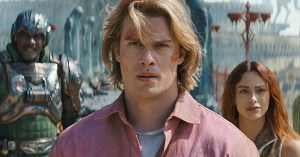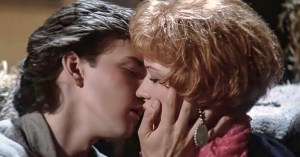Five Favorite Films with Charlie Hunnam
The star of this week's Deadfall -- and Guillermo del Toro's forthcoming Pacific Rim -- on his five favorite movies of the moment.
It’s a big, busy year ahead for Charlie Hunnam. Besides his ongoing role in TV hit Sons of Anarchy, the actor is starring in Guillermo del Toro’s massively anticipated sci-fi throwdown Pacific Rim, which marks the director’s first film in five years and looks set to be one of 2013’s summer smashes. In the meantime, Hunnam is appearing opposite Eric Bana and Olivia Wilde in this week’s snowbound neo-noir thriller Deadfall, in which he plays an ex-con boxer tangled up in a deadly game of survival.
“I’d always been interested in telling the classic hero’s journey,” Hunnam says of Deadfall. “You know, told with the contemporary narrative of a man being released from prison. I felt like the psychology of that character resonated very deeply. Through this I had the experience of being a boxer. So I put myself through a boxing academy and completely gave myself over to boxing. I did that seven days a week for five weeks.”
The rigors of such training paled in comparison to the Guillermo del Toro regime, however; which perhaps goes with the territory when you sign on for a role piloting a giant robot. “It was pretty torturous, I must say,” Hunnam laughs. “Guillermo likes practical effects. So do I, but the reality is that it’s incredibly difficult. It was the most demanding experience I’ve had in my life — partly because the nature of what I was doing was very difficult, and partly because Guillermo’s completely a slave driver.”
He laughs again. “I say that absolutely adoring the man and everything about him, but boy, he will work you til you’re on the verge of death.”
Well, Hunnam has survived to tell the tale. You can see him in Deadfall in theaters and on demand this week, and here now he talks us through five of his favorite films.
Pusher III (Nicholas Winding Refn, 2005; 92% Tomatometer)
My relationship to film is dictated to a lot by what I’m working on at the time, and right now I’m writing so there’s a few films that I’ve been watching a great deal of.
My top three films at the moment are Pusher III, A Prophet and Bullhead. I think that how those films are constructed, tonally, is what I’m looking for, because none of them follow a narrative that I’m interested in — although the worlds have some similarities. I’m looking to do a very personal exploration of a man’s journey that is, for whatever reason, slightly outside of everyday society, but still has all of those hopes and desires of everyone else in America.
I just think, of the three Pushers, for me as an audience member, enjoying those films I go backwards. I think Pusher III is a masterpiece; Pusher II I like a great deal; and Pusher is my least favorite of the trilogy, which is the only time I’ve ever had that experience. I mean, I guess I do like Godfather II more than Godfather one; well I don’t know if I like it more, I find myself watching it more frequently. I really like the struggle of that character through Pusher III. Unlike the other films, he’s really, really trying to do the right thing with his life over the course of that film. And you just see that, because of the environment he’s in and the forces that surround him, that he keeps getting pulled down over and over and over until he descends into total darkness at the end.
A Prophet (Jacques Audiard, 2009; 97% Tomatometer)
More than anything, with these three films, it was really the performances — which was certainly the actor, but it was also the writing and the direction. Powerhouse performances in all three of those movies, especially in A Prophet.
Bullhead (Michael R. Roskam, 2011; 70% Tomatometer)
You know, what I’ve really been studying are single-perspective narratives of grand character journeys, and A Prophet and Bullhead really achieve that in a wondrous way. What I’ve been trying to figure out is how to stay, as authentically as possible, within the single narrative of just the one character while bringing an entire world to life through that. It’s a challenge I’ve really been focused on.
Valhalla Rising (Nicholas Winding Refn, 2009; 71% Tomatometer)
Of the films I’ve seen of late, I adored Drive, also — another Nicholas Refn joint. You know another film I adore of Refn’s — and I seem to be in the minority on this — is Valhalla Rising.
I loved that. That’s my favorite of that trilogy he did, with Bronson and Drive.
Me too, yeah. I mean, Mads Mikkelsen is just spectacular in that movie. And it’s where I’m from, you know; it’s those hills. Well I guess it was a little further north than where I come from, but I felt a sense of pride — geographically — over that film.
It was shot in… Scotland, right?
It was shot in the highlands of Scotland, in Northumbria — which, if you go north, it turns into the highlands of Northumbria.
So you’re really nostalgic for that grim weather, huh?
[Laughs] I really am. I went from Newcastle to the Lake District and in the Lake District it rains about 275 days a year, so I’m a kid that’s used to getting rained on.
Casino (Martin Scorsese, 1995; 80% Tomatometer)
Hunger (Steve McQueen, 2008, 90% Tomatometer)
You know what’s another film that I watch over and over again? Actually I just came up with two more films, both because I think they’re masterpieces of contemporary storytelling — non-linear storytelling. Casino, I think, is probably up there with Chinatown in the best screenplays ever written. I love the film itself, but if you look at the sophistication of that screenplay and how they effortlessly move between time periods and geographic locations with no problem whatsoever — and of course they use narration but still, I feel it’s a truly spectacular display of storytelling.
And somewhat overlooked in the Scorsese filmography; at least compared to some of his other stuff.
Oh I know, I know. And it’s a film I sometimes bring up and wax lyrical about its brilliance and get a lot of kind of blank stares in return; and I think, “Go back and have a look at the way they’re telling the story, the information you’re getting and the rapidity with which that world is set up, and the nuance.” It’s just a spectacular piece of storytelling.
And then, for the same reason, I’ve been obsessed with watching Hunger.
That is a great, great film.
Yeah. More than anything, that’s a film that I’ve been watching over and over and over again, because the device with which they bring the audience into the world in that first act through a character that’s not seen in the film again, it’s just something I’ve never seen done before. It’s storytelling; it’s brave and fresh and non-linear in a way — I mean it is, it is linear, but in a non-traditional, non-linear approach to a linear narrative.
Deadfall opens theatrically this week and is available to watch on demand.





